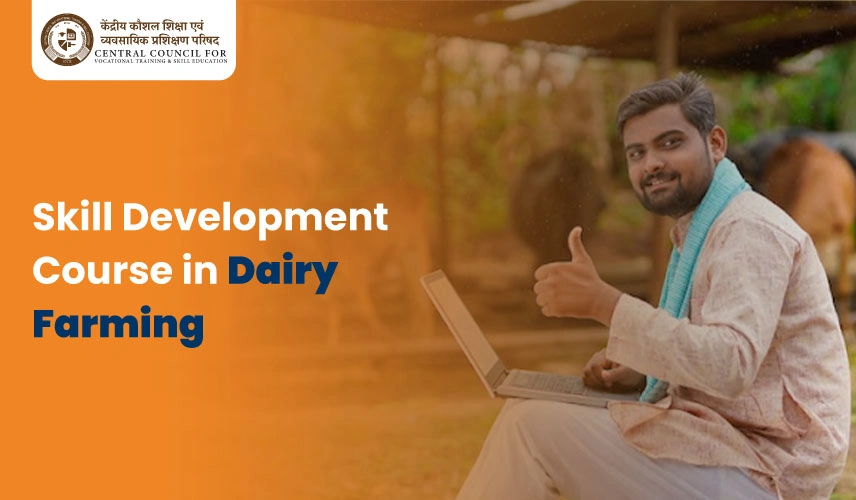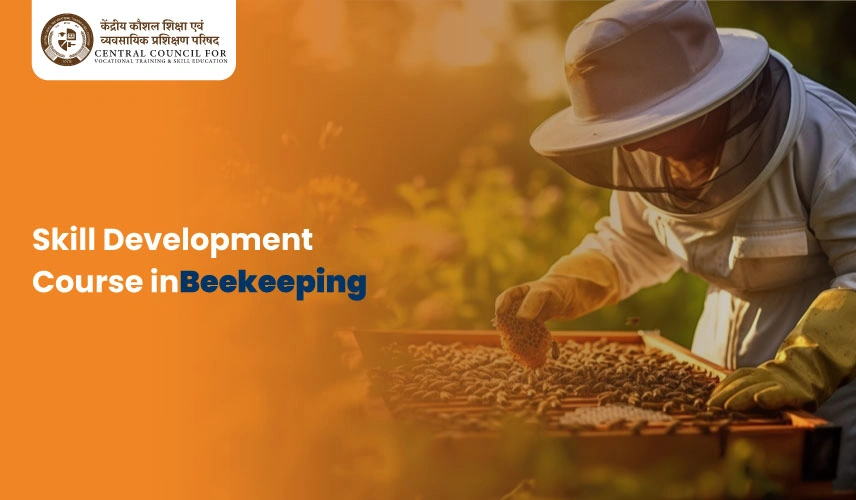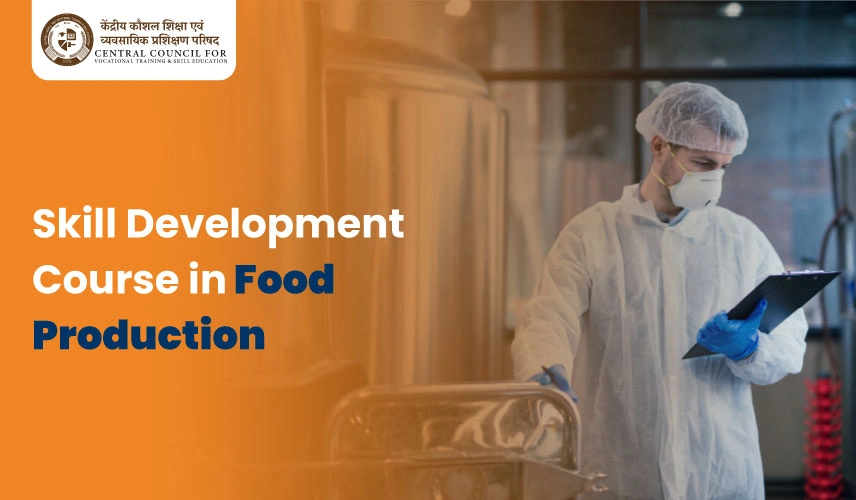- +91 8595350621
- info@ccvte.org
- C4/97B, Keshav Puram, Delhi-110035
Dairy Farming

Skill Development Program in Dairy Farming
Dairy farming is a specialized branch of agriculture focused on the production of milk and other dairy products. It plays a crucial role in providing essential nutrients to the global population, making it a cornerstone of both local and international food systems. At its core, dairy farming involves the management of dairy cattle or other milk-producing animals, such as goats and sheep, to produce milk. This process includes a range of activities, from breeding and feeding to milking and processing. The primary goal is to maintain the health and productivity of the animals while ensuring high-quality milk output. Modern dairy farming has evolved significantly over the years, incorporating advanced technologies and practices to improve efficiency, sustainability, and animal welfare. Innovations such as automated milking systems, genetic improvements, and precise nutrition management have transformed dairy farming into a highly productive and scientifically driven industry. Understanding dairy farming encompasses various aspects, including animal husbandry, veterinary care, feed management, and environmental considerations. As the global demand for dairy products continues to rise, the industry faces challenges such as sustainability, animal welfare, and market fluctuations.
Why did you choose Dairy Farming from CCVTE?
- A skill development course in Dairy Farming is specifically designed for students pursuing a career in dairy production and management.
- The course provides practical skills and knowledge essential for the dairy industry. Upon completion, students can explore job opportunities in both government and private dairy farms.
- Key highlights of the course include its flexibility and affordability, allowing students to complete it more quickly and at a lower cost compared to traditional full-time degree programs.
- The curriculum features Dairy Science, Dairy Production,Dairy Management, covering crucial topics such as herd management, dairy nutrition, milking techniques, and disease management.
- This comprehensive training offers a practical, cost-effective pathway to a successful career in dairy farming.
- The course also emphasizes hands-on experience, equipping students with real-world skills essential for managing dairy operations efficiently.
- This course prepared to address challenges in dairy farming, from optimizing milk production to ensuring animal welfare and farm sustainability.
Specializations in Dairy Farming
- Dairy Manager
- Biological science Technician
- Dairy herd Manager
- Research Assistant
- Dairy Chemistry
- Quality Assurance
- Farm Manager
- Dairy nutritionist
- Agricultural Specialist
- Food science
Career Opportunities
The dairy farming industry offers a range of dynamic career opportunities for individuals passionate about livestock management and agriculture. From overseeing daily farm operations to specializing in dairy nutrition, breeding, and veterinary care, careers in dairy farming encompass various roles that contribute to the efficient production and quality of dairy products.
As the demand for dairy products continues to grow, professionals in this field can find opportunities in large commercial dairy operations, family-run farms, research institutions, and agribusinesses. Careers in dairy farming not only provide the chance to work closely with animals and technology but also contribute to essential aspects of food security and sustainable agriculture.
- Dairy Farm Manager
- Dairy Production Specialist
- Herd Manager
- Dairy Nutritionist
- Dairy Veterinarian
- Milking Technician
- Dairy Breeding Specialist
- Quality Control Inspector
- Dairy Farm Equipment Technician
- Agricultural Extension Officer
- Research Scientist (Dairy Farming)
- Sales and Marketing Representative (Dairy Products)
- Dairy Processing Plant Operator
- Farm Consultant
Syllabus
|
3 Month |
6 Month |
1 Year |
2 Years |
|
Introduction to Dairy Farming |
Introduction to Dairy Farming |
Introduction to Dairy Farming |
Introduction to Dairy Farming |
|
Dairy Farm Management |
Dairy Farm Management |
Dairy Farm Management |
Dairy Farm Management |
|
Animal Nutrition and Feeding |
Animal Nutrition and Feeding |
Animal Nutrition and Feeding |
Animal Nutrition and Feeding |
|
Milking Techniques and Equipment |
Milking Techniques and Equipment |
Milking Techniques and Equipment |
Milking Techniques and Equipment |
|
Dairy Herd Management |
Dairy Herd Management |
Dairy Herd Management |
|
|
Disease Prevention and Management |
Disease Prevention and Management |
Disease Prevention and Management |
|
|
Dairy Farm Equipment and Machinery |
Dairy Farm Equipment and Machinery |
Dairy Farm Equipment and Machinery |
|
|
Milk Quality and Processing Techniques |
Milk Quality and Processing Techniques |
Milk Quality and Processing Techniques |
|
|
Environmental Management |
Environmental Management |
||
|
Farm Financial Management |
Farm Financial Management |
||
|
Dairy Farm Marketing and Sales |
Dairy Farm Marketing and Sales |
||
|
Practical Dairy Farming Skills |
Advanced Animal Health Management |
||
|
Practical Dairy Farming Skills |
|||
|
Sustainable Dairy Farming Practices |
|||
|
Farm Management Systems |
|||
|
Research and Innovation in Dairy Farming |
Top Hiring Opportunities in Dairy Farming
- Large Commercial Dairy Farms
- Family-Owned Dairy Operations
- Dairy Processing Plants
- Agricultural Equipment Suppliers
- Dairy Research Institutions
- Veterinary Clinics specializing in Dairy Animals
- Dairy Product Retail and Distribution Companies
- Agricultural Extension Services
- Dairy Farming Consultancies
- Cooperative Dairy Associations
Other Paramedical Courses Provided by CCVTE
Frequently Asked Questions
- Animal husbandry and welfare
- Dairy production techniques
- Feed and nutrition management
- Milking technology and practices
- Health management and disease control
- Farm management and record-keeping and many more.
- Dairy farm manager
- Livestock nutritionist
- Dairy production technician
- Farm consultant
- Dairy sales representative
Skills in animal care, dairy production, farm management, and technical knowledge related to dairy farming operations.
After completing a Dairy Farming program, career opportunities include roles such as dairy farm manager, herd manager, dairy nutritionist, and dairy veterinarian. Graduates can also work as milking technicians, quality control inspectors, and dairy production specialists. Opportunities exist in commercial dairy farms, processing plants, research institutions, and agricultural consultancies, contributing to various aspects of dairy production and management.
CCVTE offers flexible study options for the Dairy Farming program, including part-time and online courses. Students can choose evening classes, weekend sessions, or self-paced online modules to fit their schedules. This flexibility allows individuals to balance their studies with work or other commitments while pursuing their dairy farming education at their own pace.



